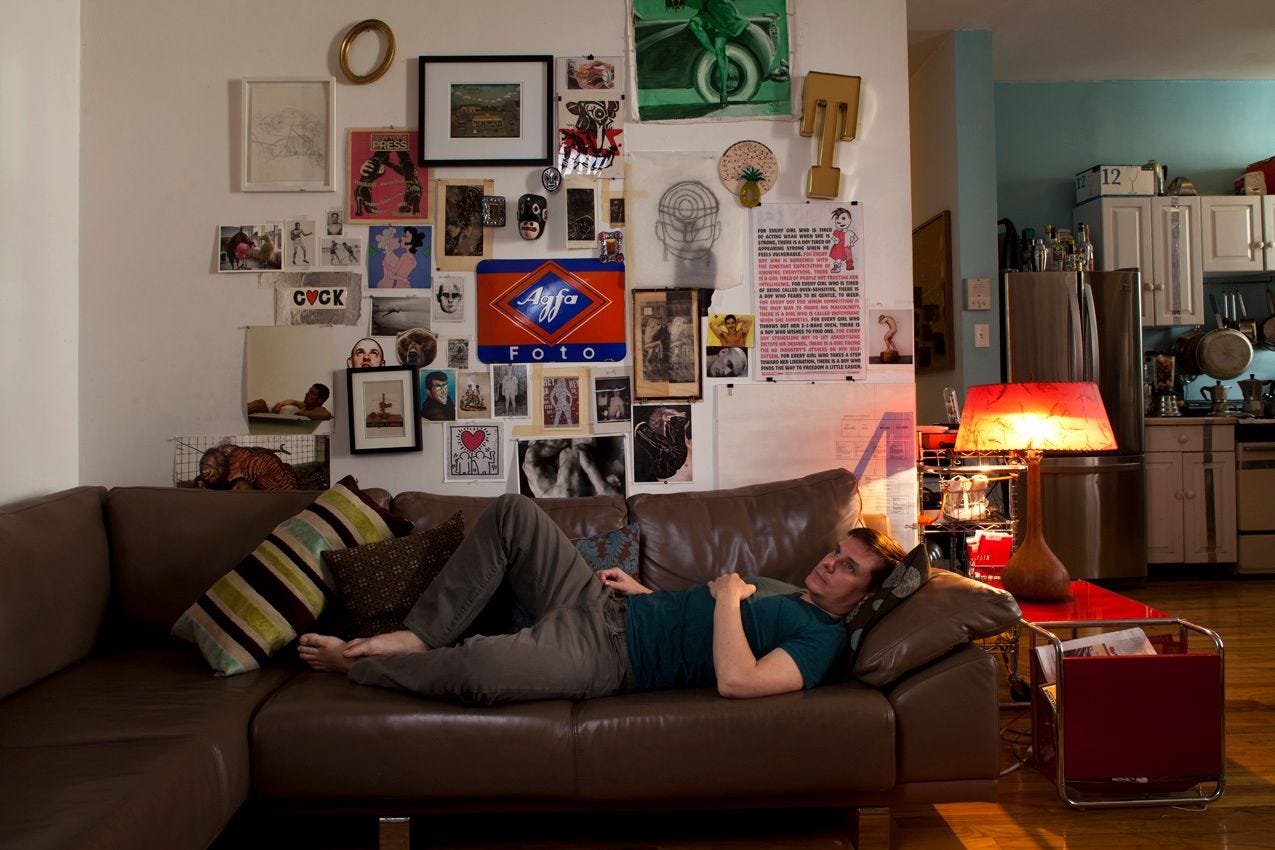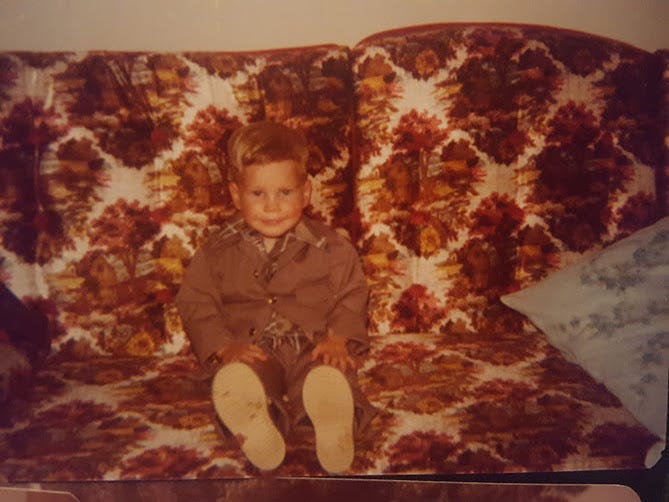This Is Not a Sofa
Jerry Portwood considers a certain kind of couch as a symbol of adulthood, and an unlikely life raft for him and his partner.

“Are you OK?” my friend Brad asked, concerned it was some suicidal signal when I invited him to walk through my apartment and make me a bid on anything. “I can really have whatever I want?” Knowing someone else appreciated my belongings gave me pleasure.
“I’m bringing a couple of books, my music is all downloaded,” I said. “I don’t need any of it.”
It was 2003, and my boyfriend Patricio was 11 years older, a tenure-track architecture and design professor at a nearby university. We’d been dating for a year when he told me he was transferring to teach in Europe and wanted me to join him. I was recently out of college, still struggling to carve out a life while hustling with part-time gigs to pay off credit card and student loan debt. I was torn: Should I chuck everything and follow my heart? Or hunker down stateside and focus on building my career?
“I’m willing to sacrifice for you,” Patricio explained when I brought up my concerns. “It doesn’t always have to be about compromise. Sacrifice means we care enough to make it sacred.” How could I argue with that? For love, I, too, could make a sacrifice.
I was recently out of college, still struggling to carve out a life while hustling with part-time gigs to pay off credit card and student loan debt. I was torn: Should I chuck everything and follow my heart? Or hunker down stateside and focus on building my career?
He then informed me that we would be living in a furnished apartment in Barcelona. Rather than putting my possessions into storage, he encouraged me to give them away. “After two years of living in Spain, your taste is going to change,” Patricio insisted.
“But it took me so long to get all of it,” I whined. “Why would I want to get rid of it now?”
I felt denounced, exposed. Despite all my efforts to transform myself from my humble beginnings, I was still mired in my working-class roots. Both my parents grew up poor in South Florida in the 1960s, but Dad pulled our family up a rung on the ladder by joining the Air Force after I was born. We achieved a version of the American Dream, although we still subsisted below the poverty line. Our family moved every few years — from North Carolina to North Texas, from the South Pacific to South Georgia. For two decades we endured constant anxiety over where our next home would be until Dad retired from the military, and my parents put down roots on two acres near the Florida-Georgia line. That’s when they began to acquire all the stuff that seemed to symbolize family contentment. This coveted bric-a-brac and bourgeois plunder all orbited around the sofa.
For two decades we endured constant anxiety over where our next home would be until Dad retired from the military, and my parents put down roots on two acres near the Florida-Georgia line. That’s when they began to acquire all the stuff that seemed to symbolize family contentment. This coveted bric-a-brac and bourgeois plunder all orbited around the sofa.
Out on my own, I tried to escape my family’s gravitational tendency to accumulate stuff, yet found myself acquiring my own anyway. I must have thought, But I’ll do it better. So I jettisoned a corduroy-upholstered hand-me-down sleeper sofa and purchased the floor model of an expensive straw-colored couch from an upscale establishment, discounted because it had one coffee-stained cushion. I called Mom to find out if it could be salvaged. “Yes, I know just the thing to get it out,” she replied, instructing me to use Simple Green, her favorite go-to remedy for most cleaning conundrums. “Plus, couldn’t you just flip it over?” She was right on both counts, and I felt a thrill in bagging my prey.
In John Guare’s play Six Degrees of Separation, Paul is a young, black protagonist who purposefully studies culture — art, books, even furniture — to learn how to interact with rich, white people. “It’s not a couch, it’s a sofa,” Paul is instructed by a well-to-do lover. Language could even betray your lack of class. I found this Pygmalion-esque tale instructive in my own pursuit of passing among sophisticated peers.
I jettisoned a corduroy-upholstered hand-me-down sleeper sofa and purchased the floor model of an expensive straw-colored couch from an upscale establishment, discounted because it had one coffee-stained cushion.
When we met 20 years ago, Patricio lived alone in a townhouse in a gentrified area of Greenville, South Carolina. The child of Cuban refugees, he’d been born and raised in Puerto Rico, and grown up poor as well. Although we came from vastly different backgrounds, we related in our aspirations to hack new paths for ourselves. Now a professor with degrees from elite institutions, he remained vigilant in his resistance to the suck of comfort and convenience, living as a quasi-bohemian. The first time I visited his apartment, I was shocked to find he had no furniture, just a futon mattress on the floor and a wall of shelves bulging with books and two long tables strewn with drawings. “I don’t need a sofa,” he said.
For our first date at his place, he assembled a Mediterranean picnic near his futon on the floor. “Let’s watch a movie,” he suggested, then wheeled in a digital projector on a metal cart. We watched an obscure arthouse film on his blank bedroom wall. The subtitles were cut off, so I had to guess what was happening as the characters spoke Spanish and criticized the capitalist American pigs. It was the most romantic night of my life.
“But I like my couch,” I replied, the next time Patricio suggested selling my possessions to prep for our Barcelona move. I’d managed to create a semblance of an adulthood — my stuff meant I’d made it as a grownup, in some small way. Although ashamed that I’d defined my personality through curated possessions, I was afraid that without those physical anchors, I’d forget who I was.
The first time I visited Patricio’s apartment, I was shocked to find he had no furniture, just a futon mattress on the floor and a wall of shelves bulging with books and two long tables strewn with drawings. “I don’t need a sofa,” he said.
“Why do you need a couch?” he asked. “You don’t need any of this junk.”
“You seem to enjoy watching TV on it,” I rebutted.
“You’ve corrupted me,” he said, stretching his legs on top of mine, beginning to nap.
Despite all the moves growing up, my family retained some part of our identity through the crap we schlepped around the world. Now, I was preparing to move in with my lover and discard the detritus of my life. And with it the adult identity I’d constructed? I tried to project into the future, and I realized I would be alright without a table. Or a sofa. Or any of my furniture. He was right, I decided. Why was I so caught up in all of it? So I chucked it all.
Patricio and I showed up in Barcelona with only a couple of duffel bags that summer. Our pied a terre was furnished, so there was no squabbling over which chair goes where or what cockamamie keepsakes we’d put on display. Here, we were both anonymous, equal. It felt like we had walked into a catalog: All blond woods and beige tiles, the apartment was bright and sterile—it ached with generic class. The rug could easily hide any food stains; the cheerful oil paintings consisted of abstract seascapes. A two-person loveseat the color of a worn football was positioned in front of an average-sized television.
It was the first time in my life that I felt I wasn’t going to be whisked away, so we spent a little money on putting down roots in our new home. But despite our being 28 and 39 at the time, without a proper sofa, it still felt like we were still co-eds.
“I know... there’s a couch here,” Patricio said.
“This is not a couch,” I corrected. “This is un sofá,” I said, using the masculine Spanish noun I’d learned in my studies.
“Yeah, you’re right,” he said, “but we’ll survive.” Although none of it belonged to me, I knew I would make it feel like home.
We spent two years together in Spain—what felt like an extended honeymoon of mutual discovery. Then we moved to New York so Patricio could begin a Ph.D. program. Devoid of belongings, we slept on an air mattress and sat on the floor, eating from new bowls we picked up at Kmart. A year after arriving, we moved into a dingy two-bedroom in West Harlem with just our boxes of books, a tiny loveseat I’d splurged on, and a cheap IKEA bed. The place didn’t have a refrigerator, so a friend in Brooklyn gifted us a mildewy one. It was the first time in my life that I felt I wasn’t going to be whisked away, so we spent a little money on putting down roots in our new home. But despite our being 28 and 39 at the time, without a proper sofa, it still felt like we were still co-eds.
Then, in 2007, we’d been together for over five years and recently filed our domestic partnership paperwork at City Hall, when Patricio’s mom said she wanted to buy us one. After much deliberation, we selected a tan leather sectional from a swanky spot on Madison Avenue, which cost much more than either of us could afford on our meager incomes. “Are you sure you want to buy it?” I asked my mother-in-law.
In 2007, we’d been together for over five years and recently filed our domestic partnership paperwork at City Hall, when Patricio’s mom said she wanted to buy us a sofa… “I want to invest in the both of you,” she said.
“Yes, I want to invest in the both of you,” she said. The delivery men plopped it down in a corner that seemed perfectly suited to its shape, and it hasn’t moved in nearly 15 years.
Since then, the sofa has served us well. Dozens of people have used it as a crash pad. Rowdy revelers have spilled beverages during various holidays and celebrations. We’re now middle aged ourselves, and the sofa has some scars and saggy areas—just like us. Over time, Patricio’s mother has slipped away into dementia, no longer able to speak or recall who we are, but we still have our memories, and her gift that was a monument to our union.
As our lives shrank over the months of quarantine during the Covid pandemic, and we both transitioned to working from home, our sofa became a refuge— the place we went “after work.” A way to say, “We’re done,” now let’s try to stop toiling and pretend our lives are not just one long hamster wheel of perpetual monotony.
I heard from a friend, whose relationship was strained during the pandemic that their couch became a battleground, a place where they staked their claims and aggressions erupted into grenades of accusations. Ours represents safety. A life raft we cling to.





Goosebumps on the word “life-raft.” What a sweet, patient rollout of time and how our lives can be tied - consciously, unconsciously- to possessions. Thank you for sharing this! Also “it was the most romantic night of my life.” The right ascetic academic really can be a double swoon :)
I married a “couch” so I love that reference!